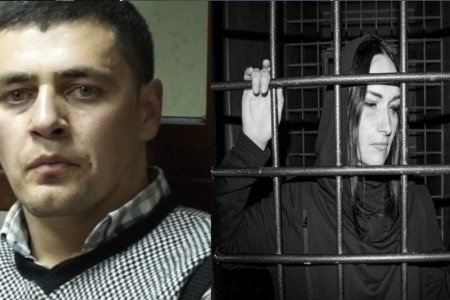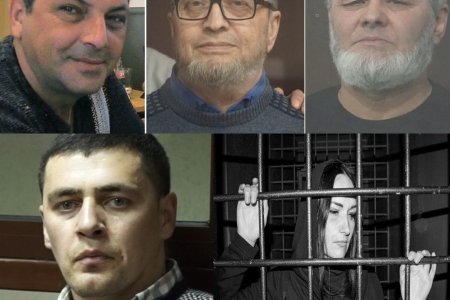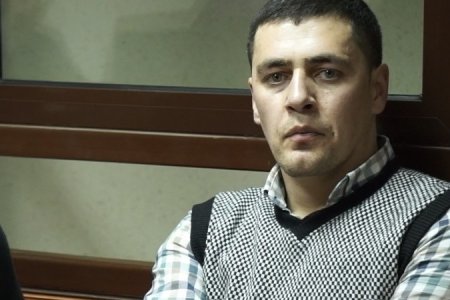
Bronislav Danilovich, father of Ukrainian political prisoner, Iryna Danilovych has died in occupied Crimea, with Iryna, who is imprisoned in Russia, prevented even from attending his funeral. Bronislav Oleksandrovych was 78 and, instead of being able to fight his own health issues, had been forced to spend the last two years seeking justice for his daughter and, effectively, fighting for her right to life in Russian captivity. Crimean Solidarity reports that he had spoken of Iryna being “our everything for him and his wife.”
Russia’s brutality against Crimean Tatar and other Ukrainian political prisoners knows no limits and Iryna Danilovych is not the first political prisoner to be stopped from attending a close relative’s funeral. Rayim Aivazov was recently prevented from fulfilling his duty by burying his father, and several Crimean Tatar political prisoners, held in detention, were unable to attend the funerals of mothers, or even in the case of civic journalist Ruslan Suleimanov, of his 3-year-old son, long before any verdict against them had been passed.
Iryna Danilovych (b. 1979) is a nurse, human rights defender and civic journalist, who refused to be silent about injustice and persecution in Russian-occupied Crimea. She was a regular contributor to independent media initiatives, like INzhir Media and Crimean Process, which wrote about Russian repression and political prisoners. She was also the head of the Crimean branch of the Alliance of Doctors trade union and had taken part in attempts to obtain the promised, yet never provided, pandemic-linked supplementary payments for medical workers. She spoke publicly, without concealing her real name, about the lies that the occupation authorities were telling about the real number of covid patients.
All, or indeed any, of this made her an obvious target for Russia’s FSB. She was abducted by FSB officers in the early morning of 29 April 2022, as she was waiting for a bus to return home after a night shift. She was held incommunicado, in a basement, for a week before being formally detained on 7 May. During that time, her FSB captors subjected her to torture and threats, trying to force her into ‘confessing’ to totally fictitious contacts with foreign organizations and to so-called ‘state treason’. When they realized that she would not break, they claimed, a week after first searching her belongings, to have ‘found’ explosives in her glasses.
No attempt, however, was ever made to make the new charge sound credible. An entire volume of the material was devoted to Iryna’s media interviews, although the charge under Article 222.1 § 1 of Russia’s criminal code had, supposedly, been laid merely because of some explosives ‘found’ in a glasses case a week after she was taken prisoner by the FSB. Nor was any attempt ever made to explain why, according to the prosecution, she had carried explosives in her glasses case to and from her night shift at the Malakhit Medical Centre in Koktebel.
The ‘trial’ took place under ‘judge’ Natalia Kulinskaya at the occupation ‘Feodosia municipal court’. Danilovych stated from the outset that she had been abducted, not ‘arrested’, with her account of events backed by CCTV footage of her seizure, as well as by the FSB’s refusal to reveal her whereabouts. The FSB even claimed that Danilovych had ‘voluntarily’ remained in their basement, with a bed, a shower, food, and other necessary items. They asserted that she could have left at any moment, but ‘decided to remain’ for want of a place to stay in Simferopol. Kulinskaya swallowed all of this surreal nonsense, even the fact that the FSB contradicted their own story. Had Iryna been in custody because of the explosives from the outset, she would not have been free to leave. If, however, she had not been able to leave, then why had there been no official charges until 7 May? On 28 December 2022, Kulinskaya handed down the entire 7-year sentence demanded by prosecutors Dmitry Lyashchenko and Yulia Matvyeya. This also made no sense as she also removed the part of the charges alleging that Danilovych had purchased the explosives since the FSB had not even tried to come up with some plausible explanation. A 50-thousand rouble fine was also imposed.
The sentence was upheld on 29 June 2023 by the occupation ‘Crimean high court’ with no attempt made here either to imitate a real review of the case. Presiding ‘judge’ Valeria Chernetska and two colleagues reduced the 7-year sentence by all of one month.
The ‘court’ also refused to take into account the fact that Iryna had been unable to full acquaint herself with the case material due to her state of health, caused by failure to treat an agonizing ear infection from October 2022. This caused substantial loss of hearing, and may have contributed to other, potentially life-threatening conditions. There are grounds for fearing that she suffered a stroke in Russian captivity as a direct result of the failure to provide vital healthcare.
There are never any words to express sympathy for somebody’s loss, and still less in a situation like this, however Iryna needs letters to know that she is not forgotten. The letters also serve as an important reminder to Moscow that their treatment of her is under scrutiny. The letters, unfortunately, need to be handwritten and in Russian. They should also be on ‘safe’ subjects, as they will be read by the censor.
The address below can be written in either Russian or in English transcription.
357910 Российская Федерация, ул. Почтовая д.78, Ставропольский край, г. Зеленокумск, ИК-7 Зеленокумск
Данилович, Ирине Брониславовне, г.р. 1979
[Or in English:
357910 Russian Federation, Pochtovaya St, No. 78, Stavropol Krai, Zelenokumsk, Women’s Prison Colony No. 7
Danilovich, Iryna Bronislavovna, b. 1979 ]
If it is difficult to write, please help Iryna by publicising her case! Ideas for how western diplomats could also assist can be found here.



